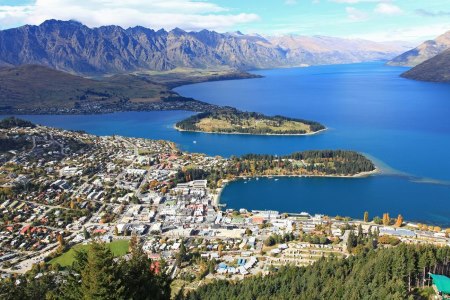As a country that has contributed over half a billion dollars to the United States via direct investment, New Zealand is a valuable economic ally that has, until recently, been limited by the restrictions on which U.S. visas its citizens could apply for. As of August 1, 2018, this is no longer the case. President Donald Trump signed the Knowledge Innovators and Worthy Investors Act (cleverly abbreviated to KIWI) into law, presenting New Zealanders with the enviable opportunity to apply for E-2 treaty investor visas and E-1 treaty trader visas.
Who Supports the KIWI Act?
 The KIWI Act was introduced by Senators Mazie K. Hirono (D) of Hawaii and Mike Lee (R) of Utah and has received bipartisan support from both prominent Democrats and Republicans. Senators who backed the KIWI Act with outspoken support include Tim Caine (D. Virginia), Roger Wicker (R. Mississippi), Patty Murray (D. Washington), Cory Gardner (R. Colorado), and the late John McCain (R. Arizona). Allowing New Zealand citizens to apply for E-2 and E-1 visas is universally recognized as an excellent economic decision for both the United States and New Zealand and breaching this boundary that restricted trade and investment is expected to strengthen the relationship between the two nations.
The KIWI Act was introduced by Senators Mazie K. Hirono (D) of Hawaii and Mike Lee (R) of Utah and has received bipartisan support from both prominent Democrats and Republicans. Senators who backed the KIWI Act with outspoken support include Tim Caine (D. Virginia), Roger Wicker (R. Mississippi), Patty Murray (D. Washington), Cory Gardner (R. Colorado), and the late John McCain (R. Arizona). Allowing New Zealand citizens to apply for E-2 and E-1 visas is universally recognized as an excellent economic decision for both the United States and New Zealand and breaching this boundary that restricted trade and investment is expected to strengthen the relationship between the two nations.
United States-New Zealand Council Chairman, Edward Farrell, said: “Americans and New Zealanders collaborate closely in business, technology, research, security, and entertainment, yet the lack of access to trader and investor visas has been a serious barrier to increased economic growth and greater bilateral cooperation.” He notes that “The E1 and E2 visa categories were created expressly to benefit the U.S. economy by promoting capital infusion and job creation. The United States currently allows temporary entry for traders from more than 50 countries (under E1 visas) and for investors from more than 80 countries (under E2 visas).” Farrell believes this relationship is, “in our shared best interests and it’s long overdue,” and that “New Zealand should be given the same accessibility as an important ‘partner, supporter and friend of the United States, and an influential thought leader throughout the world.’”
Until recently, New Zealand considered itself to be low on the United States’ priorities, in terms of trade and investment. The country has lobbied for E-2 and E-1 status in the past, but, according to Reuter’s, the New Zealand embassy in Washington got the U.S.’s attention in April 2017 by hiring former Trump campaign director, Stuart Jolly, who lent gravity to its petition. After years of prioritizing a free trade negotiation with the United States, New Zealand has finally secured the U.S. as a valuable economic ally.
A Match Made in Cyberspace
New Zealand is rapidly cementing itself as a mainstay for innovation and technology, and U.S. tech innovators are already flocking there. Rocket Lab is a Los Angeles – based aerospace manufacturer with a New Zealand subsidiary, and the bulk of its operations take place in New Zealand. The company was launched by CEO Peter Beck in 2006, and has several big-name investors, including Lockheed Martin. It has already launched four satellites, and its overall mission is to “redefine how we access space.” The company manufactures its spacecrafts in Auckland, New Zealand. New Zealand is appealing to U.S. tech innovators, in part, because of its remoteness. It offers a laid-back environment, with very few barriers for Americans who want to start businesses, and the country issued 78 percent more work visas to American tech workers in October 2017 than it did during the same period in 2012. This relationship has laid the groundwork for what is set to be a long-term, mutually beneficial relationship between the two nations as the U.S. introduces E-2 and E-1 visas for New Zealand’s many talented tech entrepreneurs.
New Zealand is a hotbed for self-starters who, if they choose to expand their businesses to the United States, would provide unique products that would improve Americans’ everyday lives and provide valuable jobs for U.S. workers, strengthening local economies. New Zealand is especially noteworthy for producing numerous inventive, high-profile female entrepreneurs who are creating innovative new products that are changing the face of several industries. One of these industry leaders is Natural language processing expert Alyona Medelyan, the CEO and co-founder of Thematic, a Y Combinator-backed SaaS company helping companies achieve better customer experience and retention and insights via feedback analytics. Others include Laura Bell, CEO of SafeStack, a New Zealand-founded global security company that specializes in agile application security, and Hiria Te Rangi, a CEO who makes affordable Whare Sensors to measure the healthiness of New Zealand homes after seeing how unmonitored homes can contribute to chronic illnesses.
Other notable New Zealand entrepreneurs founded Crimson Education, a company formed by a teenage couple – Jamie Beaton and Sharndre Kushor who became two of the youngest and most successful entrepreneurs globally aimed at helping young people like themselves achieve their dreams of earning a degree from top U.S. and U.K. universities when they were just 18 years old. Their company, Crimson Education, reaches out to high school students around the world and connects them with a wide network of tutors who assist with standardized testing, like the SAT and ACT, provide career mentorship, provide support for obtaining scholarships, and much more.
If these Kiwi entrepreneurs, or any of the hundreds of others like them from New Zealand, decide to move their businesses to the United States, open a subsidiary, or invest in similar U.S. ventures, it would be a tremendous boon for both the U.S. economy and for U.S. consumers. Companies are increasingly utilizing analytics to streamline everything from their products and marketing to their hiring practices using analytics like those created by Thematic, and “healthy homes” are a rising trend in the housing market, with about 24% of homeowners expressing concerns. The U.S. technology sector is constantly evolving and needs fresh perspectives and creative minds like those represented by these New Zealand companies to keep up with the demands of businesses and individual consumers.
What are E-2 and E-1 Visas and Who Are They For?
 The E-2 and E-1 visas differ from each other in several ways, and which one a New Zealand entrepreneur must apply for depends on what kind of business they plan to conduct in the United States. The E-1 Treaty Trader visa is a nonimmigrant visa intended for companies that perform substantial trade with the United States (goods or services), and visas are typically granted based on the volume of trade. The E-1 visa is intended for applicants who plan to conduct substantial trade between their home country and the United States. The USCIS requires that applicants have experience with such trade and must be assured that their transactions have a substantial dollar value. At least half of all E-1 visa businesses must demonstrate that at least 50% of their overall trade volume is carried out between the U.S. and their treaty country. Applicants can renew their E-1 visa, typically, every two years and remain in the U.S. if they and their business still fulfill the visa conditions.
The E-2 and E-1 visas differ from each other in several ways, and which one a New Zealand entrepreneur must apply for depends on what kind of business they plan to conduct in the United States. The E-1 Treaty Trader visa is a nonimmigrant visa intended for companies that perform substantial trade with the United States (goods or services), and visas are typically granted based on the volume of trade. The E-1 visa is intended for applicants who plan to conduct substantial trade between their home country and the United States. The USCIS requires that applicants have experience with such trade and must be assured that their transactions have a substantial dollar value. At least half of all E-1 visa businesses must demonstrate that at least 50% of their overall trade volume is carried out between the U.S. and their treaty country. Applicants can renew their E-1 visa, typically, every two years and remain in the U.S. if they and their business still fulfill the visa conditions.
The E-2 Treaty Investor visa, however, is based on applicants investing “substantial” at-risk funds to support the starting, purchasing, operating, and expansion of a business or franchise in the United States. There is no set amount that applicants must invest, and USCIS’s decision is based on the type of business an E-2 visa applicant wishes to operate based on the standards within the industry, which can be an advantage for investors who wish to operate smaller businesses and startups. If you are interested in learning more about the E2 Investor Visa Minimum Investment Amount, then please head over to that page to see what level of investment may work for the type of business you are looking to invest in. The E-2 visa must be renewed every two to five years for the applicant to remain in the U.S., and all investment funds must be proven to have been acquired legally. The reason for the applicant’s stay in the U.S. must be for the sole purpose of operating their business since the E-2 is a non-immigrant visa and is temporary in nature, and if applicants choose not to renew their visa, they must be prepared to return to their home country.
The E-2 is often the go-to visa for would-be investors and entrepreneurs, as it allows for more flexibility than other non-immigrant visas and does not require a job offer. E-2 visa holders can control their investment, as long as their business continues to operate in a regular and systematic manner, and that it employs U.S. workers. E-2 visa holders are allowed to frequently travel outside of the U.S. Dependent children of E-2 visa holders are allowed to attend U.S. public schools until they turn 21, and their spouses are allowed to work, subject to work authorization. For New Zealand citizens wishing to remain in the U.S. long-term, the E-2 is an excellent option because, if they continue to operate a profitable business and fulfill all visa requirements, they can remain in the U.S. indefinitely as non-immigrants. Whether a New Zealander decides to apply for an E-2 or an E-1 visa, they now have unprecedented opportunities open to them in the United States and can enjoy the benefits of openly trading and investing in a nation with a thriving economy and ample demand for innovative products and services. If you are not from New Zealand and would like to know if the country you are a national of has a treaty of trade or commerce with the United States, take a look at a complete list of E2 Treaty Countries.
How JDC Consultancy Can Help
 Applying for a visa can be a challenge, and for Kiwi E-2 and E-1 visa applicants, enlisting expert help will simplify the process. One of the key elements of both E-2 and E-1 visa applications is a thorough, comprehensive business plan that demonstrates the investor’s ability to operate a business successfully in the United States over the next five years. An E-2 visa business plan or an E-1 business plan is a complex document, requiring in-depth knowledge about what USCIS is looking for in a company before it grants a visa.
Applying for a visa can be a challenge, and for Kiwi E-2 and E-1 visa applicants, enlisting expert help will simplify the process. One of the key elements of both E-2 and E-1 visa applications is a thorough, comprehensive business plan that demonstrates the investor’s ability to operate a business successfully in the United States over the next five years. An E-2 visa business plan or an E-1 business plan is a complex document, requiring in-depth knowledge about what USCIS is looking for in a company before it grants a visa.
JDC Consultancy is here to help ensure E-2 applicants and E-1 applicants can present their business in the best possible light and to increase the likelihood of a successful application. Since 2006, our sole aim has been to help hundreds of entrepreneurs from around the globe realize their dreams of living and working in the United States. We are thrilled to have the opportunity to help New Zealand’s entrepreneurs showcase their businesses and obtain their E-2 and E-1 visas in the coming years.
Contact Details for the U.S. Consulate General in New Zealand
U.S. Consulate Auckland NZ
Private Bag, 92022,
Auckland, New Zealand
Website
Email: AucklandACS@state.gov
Telephone for scheduling or payment of fees +64 4 462 6000 (within New Zealand) 011 646 259 0526 (outside of New Zealand)
Contact Details for the U.S. Embassy in New Zealand
U.S. Embassy Wellington NZ
29 Fitzherbert Terrace,
Thorndon 6011
Website
Email: support-newzealand@ustraveldocs.com
Telephone for scheduling or payment of fees: +64 4 462 6000 (within New Zealand) 011 646 259 0526 (outside of New Zealand)

